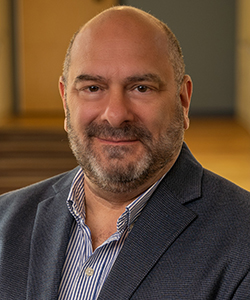YOUNGSTOWN, Ohio – With the precarious state of the economy and the world, the pressures of working, family dynamics and the recent pandemic, more people are reporting anxiety and depression.
The CEO of Alta Care Group, Joe Shorokey, says in nearly 40 years of mental health care for children and teens, he has witnessed a shift from more children externalizing behavioral problems, such as oppositional, defiant and hyperactivity symptoms to more children internalizing their problems in the forms of depression, anxiety, social withdrawal and isolation.
Anxiety and depression are the most common mental disorders reported, according to the National Alliance on Mental Illness.
The alliance says 19% of adults report anxiety, followed by 8% saying they have symptoms of depression. Also, 8% abuse substances and have mental illnesses.

Larry Moliterno, president and CEO of Meridian HealthCare, agrees most patients seek help from anxiety and depression. What concerns him, he says, is someone is seeing only his primary care physician for help with the problem.
According to a study published by the Yale Journal of Biology and Medicine, private care providers prescribe 79% of antidepressant medications and see 60% of those treated for depression. They receive little support from specialist services. Moliterno emphasizes the importance of someone receiving antidepressants to follow up.
“We really think it’s important that if you’re going to have medication for those issues that you pair it with counseling so that you can have the best success and actually get to the root of your depression and anxiety,” Moliterno says.
In addition, Moliterno would like to see a push toward more behavioral health services combined with primary health care for those patients and their families who struggle mentally as they go through a cancer diagnosis and treatment, fertility issues and post-operative rehabilitation. The patient needs to stay mentally strong to overcome his physical condition and needs his family’s support as well.
The chief officer of Trumbull/Mahoning for Coleman Health Services, Catherine Blankenship, says her organization employs case managers to help people get on track with issues affecting their mental health.
“Certainly helping them get back on their feet and get those basic needs in place so the other work can be done,” Blankenship says.

For instance, the rising cost of living can be tough on anyone – even more so for someone dealing with mental illness, Blankenship says.
Case managers with Coleman help to provide wraparound services, making sure people have access to their physical needs – a medical, dental or vision appointment; housing; legal help and other barriers.
That stability gives them the strength to battle their mental illness, she says. “Since the pandemic we have seen an increase in mental health substance-use disorder concerns… Homelessness is a huge problem right now in the Valley and in our communities,” Blankenship says. “I think that has increased since the pandemic as well.”
Although it may not be directly related to Covid, Moliterno says some people had trouble re-entering society when the pandemic ebbed and others did not deal well with losing elderly loved ones when Covid restrictions kept them from grieving.
While the shift toward more issues with anxiety and depression began before Covid, Shorokey says the pandemic just made the problem worse.
“During the pandemic, we all saw it coming,” Shorokey says. “In the mental health field, we all talked about [how] the mental health crisis was going to begin in a year or two. It did in youth and in adults as well.”
The good news is more people are willing to reach out for professional help, Moliterno says, especially young people.
Telehealth and Technology
The pandemic also changed how mental health services are delivered, especially to children in low-income families.
Telehealth, which did not become an option until the pandemic forced everyone to use it, is a way for those without the means to get to appointments or who have a distance barrier to get counseling.
At Alta Care, Shorokey says the agency still has a quarter of its patients using telehealth, including more than 40% of those using medications regularly prescribed by psychiatrists or nurse practitioners.
In addition to those in need of transportation, Moliterno says, telemedicine also can be useful in getting someone with social anxiety through the door.
“It’s a nice way to start them into counseling and get them more comfortable with the counseling process to start working on some of those issues,” Moliterno says.
Technology also is leading to advances in mental health. Moliterno says those dealing with PTSD are good candidates for Transcranial Magnetic Stimulation, which specialists at Meridian are successfully using to stimulate the brain with few side effects. The service is offered for free to veterans and first responders.
Moliterno cites one veteran who had been struggling to sleep because of his PTSD. After a few treatments, he overslept and missed his appointment.
“We’re starting to do some research on using that same technology around substance use disorder. It could be a game-changer for the industry if we continue to have success,” Moliterno says.
Staffing Shortages

One of the biggest hurdles facing mental health services in the Mahoning Valley, Shorokey says, is finding staff. With fewer people getting their master’s degree in the field to be licensed, there is more demand than supply.
“I think the Mahoning County Mental Health Board’s continuum of care is strong and we have very strong providers with a very diverse array of services for children and adults,” Shorokey says.
“We all have trouble keeping up with the request of services, not because we don’t have the facilities or the services, but because we don’t have the staff.”
While Coleman is able to serve 5,000 people a year in the Mahoning Valley, Blankenship says the goal is always to help more and the need is there.
“We need a shift to get upcoming students and people interested and re-engaged in community mental health because we know it is so impactful to the Mahoning Valley that we have these services,” Blankenship says.
Moliterno believes it is getting better with new graduates slowly filling in after so many mental health professionals retired earlier than planned during the pandemic.
Another need Shorokey sees is emergency overnight respite for children. In cases where the police have been called, children’s services is involved. Perhaps the best course of action is to remove the child for a night and give everyone a break, Shorokey notes. But there is no good option in the Mahoning Valley as to where to place the child, short of hospitalization or detention facilities.
Through the Ohio RISE initiative, Alta Care helps youth in crisis in Mahoning County while Coleman Health Services offers the same service in Trumbull County. The Mobile Response and Stabilization Service provides a 24-hour program that responds to certain levels of crisis in homes and looks for ways to stabilize the situation.
Blankenship says sending children to a hospital or detention center isn’t always the best outcome. Her agency focuses on helping the family implement various skills and getting the child connected to resources to mitigate the cause of the situation, while keeping the child in the home.
“A lot of times crisis can be mitigated in the home with services wrapped around that family,” she says.
